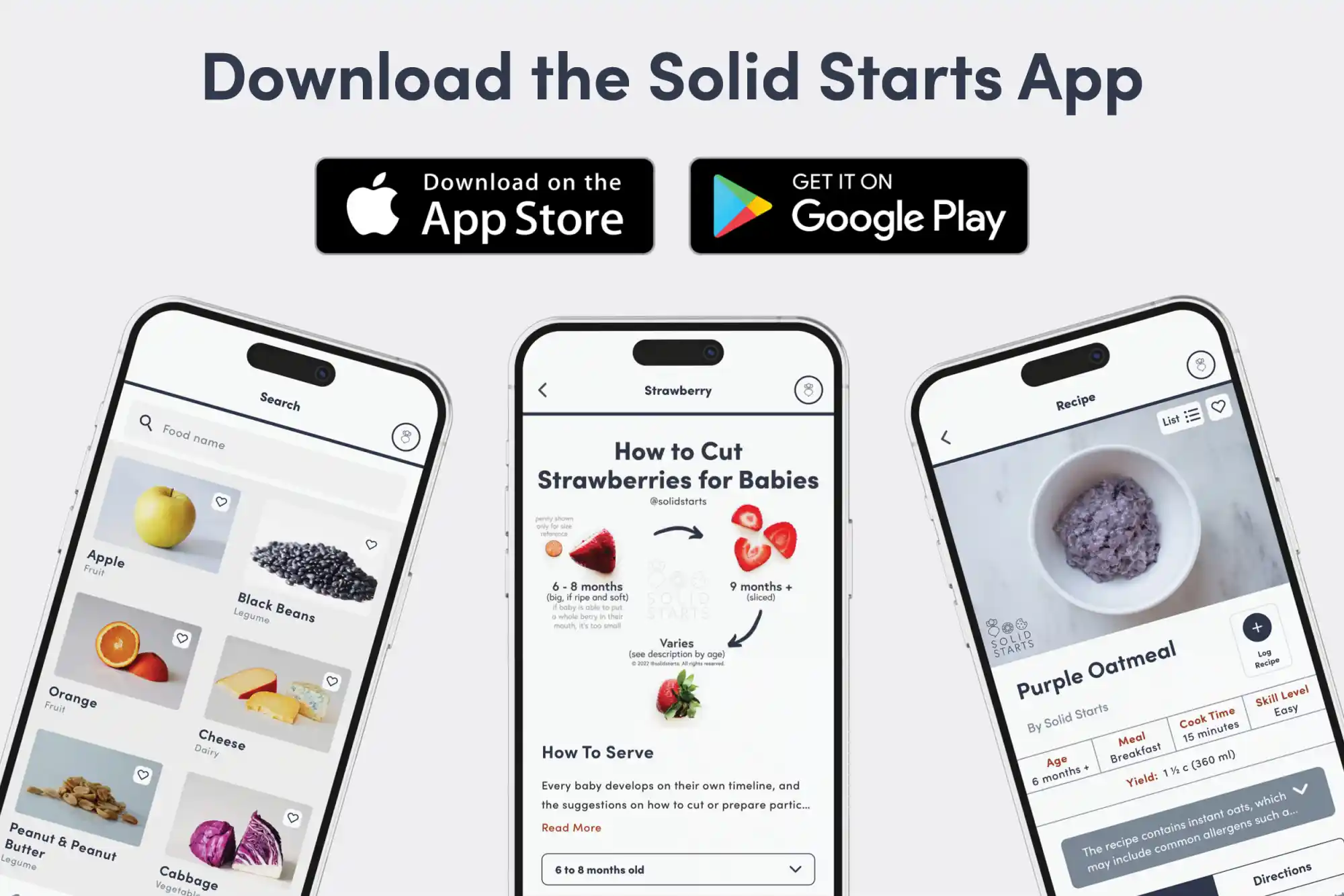Access our First Foods® Database in the Solid Starts App.
Learn moreLemon
Fruit
Age Suggestion
6 months
Iron-Rich
No
Common Allergen
No

When can babies have lemons?
Lemon may be introduced as soon as baby is ready to start solids, which is generally around 6 months of age. Note that lemon is highly acidic and may cause a harmless and temporary rash upon contact with skin and also may cause or worsen diaper rash.
Lemons are part of the citrus family—a diverse group of fruits that vary in acidity, color, shape, size, and taste. While its precise origin is unknown, it is believed that lemon is a natural hybrid of wild citrus varieties that grew in the lands around the Mediterranean Sea many centuries ago. Over time, colonization and trade led to cultivation of the hundreds of varieties of lemon available worldwide today, from sweet meyer lemon to super sour ponderosa lemon.
How do you serve lemons to babies?
Every baby develops on their own timeline, and the suggestions on how to cut or prepare particular foods are generalizations for a broad audience.
6 months old +:
Use lemon juice or lemon zest to season age-appropriate fruit, vegetables, grains, or other foods to share with baby. You can also use lemon as a way to boost vitamin C in meals with beans, lentils, leafy greens, and other foods with lots of plant-based iron. Baby may enjoy tasting lemon on its own. If you have a large lemon (i.e. if the lemon is larger than baby’s mouth), remove the seeds and pass a lemon half to baby as you take the opportunity to start teaching the word sour.
12 months old +:
Add lemon juice and lemon zest to meals as desired. At this age, toddlers may be able to practice squeezing lemon onto their own food. Offer a large lemon wedge (seeds removed) and teach the child how to squeeze the fruit and sprinkle the juice. You can also share meals that are seasoned with preserved lemons; just make sure to cut the preserved lemon into bite-sized pieces and remove any leftover seeds.
Videos
Are lemons a choking hazard for babies?
No. Lemon presents a low risk when safely prepared for a child’s age and developmental ability, though, in theory, an individual could choke on any food. To reduce the risk, prepare and serve lemon in an age-appropriate way as described in the How to Serve section. As always, create a safe eating environment and stay within reach of baby during meals.
Learn the signs of choking and more about choking first aid in our free guides, Infant Rescue and Toddler Rescue.
Are lemons a common allergen?
No, lemon is not classified as a common food allergen. However, self-reported sensitivity to citrus is described frequently in medical literature around the world. Also, individuals with Oral Allergy Syndrome (also called pollen food allergy syndrome) may be sensitive to citrus fruits such as lemons. In particular, individuals who are allergic to grass and certain tree pollens may also be more sensitive to citrus fruits. Oral Allergy Syndrome typically results in short-lived itching, tingling, or burning in the mouth, and it is unlikely to result in a dangerous reaction. Peeling or cooking lemon can help minimize the reaction. The peel of lemon also contains a compound called limonene, which is a known contact allergen, and can cause allergic contact dermatitis in sensitized individuals.
Note that lemon is highly acidic, and exposure to the acid may cause a harmless rash upon contact with skin, typically around the mouth. The rash usually dissipates shortly after it shows up. Additionally, the acidity of citrus fruits like lemon can cause or worsen diaper rashes when consumed in excess. Barrier ointments (such as pure petroleum jelly or a plant-based oil/wax combination) can be applied to the face and diaper area before mealtime to help protect the skin.
Lemon is also associated with phytophotodermatitis, a skin condition that occurs when a person gets the juice from the fruit on the skin and doesn't wash it off. Compounds in the juice are activated by the sun and cause a pigmented, itchy, and occasionally blistering and painful rash on the skin. Cleansing the skin after citrus contact and using sun protection can help to prevent the phytophotodermatitis rash.
As you would when introducing any new food, start with a small amount at first and follow baby’s lead.
Are lemons healthy for babies?
Yes. Although typically consumed in small amounts, lemon offers fiber and fluid, in addition to folate, potassium, and vitamins B6 and C. Together, these nutrients work together to support digestive health, hydration, electrolyte balance, metabolic processes, immune function, and iron absorption. Lemon peel also contains numerous plant-based compounds like flavonoids that have anti-inflammatory and antioxidant properties to support bodily repair and recovery.
When can babies drink lemonade?
Small amounts of lemonade may be shared as a drink after 12 months of age. That said, it can be beneficial to wait until after a child’s 2nd birthday to regularly share juice and other sugary drinks. Research suggests that regular intake of juice and other sweet drinks tends to increase the risk of dental cavities and take up space in the belly, which may decrease a child’s motivation to eat other foods at mealtime and may negatively affect the child’s growth. However, occasional servings of lemonade after one year of age generally isn’t a cause for concern. Learn more about juice for babies and toddlers.
Our Team
Written by
Expert Tips Delivered to Your Inbox
Sign up for weekly tips, recipes and more!
Copyright © 2026 • Solid Starts Inc






